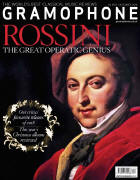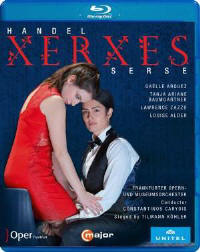Texte paru dans: / Appeared in: |
|
|
Outil de traduction (Très approximatif) |
|
|
Reviewer:
Richard Wigmore
You might say
that this sour ending is the logical outcome of director Tilmann Köhler’s
vision, where the tyrannical, selfregarding Serse is capricious to the point
of instability, liable to turn vicious at any moment. In his Act 1 aria ‘Di
tacere’ he seems on the verge of raping Romilda, the object of his infatuation.
In the libretto and Handel’s music she is presented as the more serious of the
two sisters, unswervingly devoted to Serse’s brother Arsamene. Here she is as
flighty as her sister Atalanta, sexually attracted to Serse, as the booklet
photo makes clear. Things are further complicated by an unscripted attraction
between Atalanta and Arsamene. There are cat fights between the sisters; and at
one point we get a freeze frame of the ‘wrong’ pairings that evokes the
partner-swapping of Così fan tutte. It’s my guess that Così’s
ambivalences and problematic ending influenced Köhler’s whole conception of
Serse.
Yet while the
director plays up the elements of chaos (epitomised by the set’s progressively
trashed dinner table) and incipient cruelty, his modern-dress staging, complete
with video installations, is theatrically compelling and psychologically
convincing. In a uniformly fine, camerafriendly cast, all the singers throw
themselves with gusto into their roles and interact vividly. Amid the
production’s physicality, Köhler is unafraid of stillness at moments of
reflection, whether in the arias for the put-upon Arsamene – movingly performed
by the deep-toned countertenor Lawrence Zazzo – Amastre’s tender ‘Cagion son io’,
or the chastened Atalanta’s minuet song ‘Voi mi dite’, sung with poise and grace
by Louise Alder.
Earlier in the
opera Alder plays the minx to the life as she sharpens her claws in pursuit of
Arsamene. Her feeling for the Handelian line and sparkling coloratura are
matched by the American soprano Elizabeth Sutphen, whose wilful, strongly sung
Romilda is emphatically not a woman to be messed with. Tanja Ariane
Baumgartner’s powerful mezzo catches both Amastre’s outrage (not least in
a sulphurous ‘Anima infida’) and her vulnerability. Of the two basses, Brandon
Cedel sings with sturdy resonance as the worthy-but-dim general Ariodate, while
Thomas Faulkner’s amusing but unhammed Elviro irresistibly suggests a proto-Leporello
in his backchat with his master Arsamene. As the trigger of the opera’s
comic-cruel mayhem, Gaëlle Arquez rightly dominates, vocally and dramatically,
in the huge role of Serse, written for the castrato-fromhell Caffarelli. Her
warm, flexible mezzo soars easily above the stave, she phrases generously, and
brings a mingled fire and intense pathos to Serse’s central aria di bravura
‘Se bramate’. Constantinos Carydis sets languorous tempos in one or two numbers and can arbitrarily introduce solo strings where Handel prescribes tutti. For reasons I can’t fathom, Act 2 ends not with Romilda’s avowal of enduring love ‘Chi cede al furore’, here displaced to Act 3, but with Serse’s meditative ‘Il core spera’, which is then cut off in mid-sentence. But on the whole Carydis’s direction, always responsive to the singers, meshes well with the production – though the alert orchestra can suffer in the balance. If Köhler’s Serse leaves a slightly nasty taste in the mouth, I enjoyed it at least as much as Nicholas Hytner’s famous ENO production that balances elegant artifice with clever comic gags (Philips, 5/93). And for freshness and consistency of singing, the Frankfurt performance wins hands down. |
|




